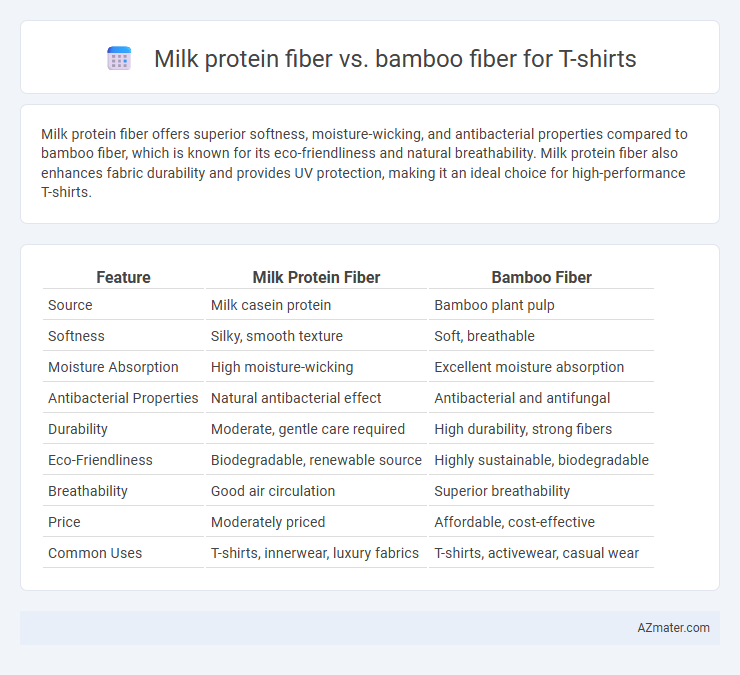Milk protein fiber offers superior softness, moisture-wicking, and antibacterial properties compared to bamboo fiber, which is known for its eco-friendliness and natural breathability. Milk protein fiber also enhances fabric durability and provides UV protection, making it an ideal choice for high-performance T-shirts.
Table of Comparison
| Feature | Milk Protein Fiber | Bamboo Fiber |
|---|---|---|
| Source | Milk casein protein | Bamboo plant pulp |
| Softness | Silky, smooth texture | Soft, breathable |
| Moisture Absorption | High moisture-wicking | Excellent moisture absorption |
| Antibacterial Properties | Natural antibacterial effect | Antibacterial and antifungal |
| Durability | Moderate, gentle care required | High durability, strong fibers |
| Eco-Friendliness | Biodegradable, renewable source | Highly sustainable, biodegradable |
| Breathability | Good air circulation | Superior breathability |
| Price | Moderately priced | Affordable, cost-effective |
| Common Uses | T-shirts, innerwear, luxury fabrics | T-shirts, activewear, casual wear |
Introduction to Eco-Friendly Fibers in T-Shirts
Milk protein fiber and bamboo fiber are both innovative eco-friendly materials used in sustainable T-shirt production, offering unique benefits for environmentally conscious consumers. Milk protein fiber is derived from casein, a protein found in milk, providing softness, moisture-wicking properties, and biodegradability, while bamboo fiber originates from bamboo pulp, known for its natural antibacterial qualities, breathability, and rapid renewability. Both fibers reduce reliance on conventional cotton, contributing to lower water consumption and chemical use in textile manufacturing, making them ideal choices for sustainable fashion.
What is Milk Protein Fiber?
Milk protein fiber is a sustainable textile made from casein, a protein derived from milk, known for its softness, moisture-wicking properties, and antibacterial effects, making it an excellent choice for comfortable and hygienic T-shirts. Bamboo fiber, in contrast, is a natural cellulose fiber extracted from bamboo plants, prized for its breathability, durability, and eco-friendly cultivation. Milk protein fiber offers a unique combination of protein-rich comfort and skin-friendly benefits, distinguishing it from plant-based fibers like bamboo in T-shirt applications.
What is Bamboo Fiber?
Bamboo fiber is a natural textile fiber derived from the pulp of bamboo plants, known for its softness, breathability, and antibacterial properties. It offers moisture-wicking capabilities and is environmentally sustainable due to bamboo's rapid growth and low water requirements. Compared to milk protein fiber, bamboo fiber provides enhanced durability and better odor control, making it an excellent choice for T-shirts.
Production Process: Milk Protein Fiber vs Bamboo Fiber
Milk protein fiber is produced through an eco-friendly process that extracts casein protein from milk, which is then dissolved and spun into fibers using a lyocell-like method, ensuring biodegradability and softness. Bamboo fiber undergoes a mechanical or chemical process where bamboo pulp is either crushed and combed into fiber mechanically or subjected to chemical treatments to produce viscose rayon, with the chemical method raising environmental concerns. The production of milk protein fiber typically involves less harmful chemicals and a more sustainable process compared to the conventional bamboo viscose method, although bamboo's mechanical processing offers a greener alternative with a more labor-intensive approach.
Softness and Comfort Comparison
Milk protein fiber offers exceptional softness and moisture-wicking properties, making it ideal for comfortable T-shirts that feel smooth against the skin. Bamboo fiber is naturally breathable, hypoallergenic, and has excellent moisture absorption, contributing to a cool and fresh wearing experience. When comparing the two, milk protein fiber tends to provide a silkier texture, while bamboo fiber excels in breathability and antibacterial comfort.
Moisture Absorption and Breathability
Milk protein fiber offers excellent moisture absorption due to its porous structure, efficiently wicking sweat away from the skin, making it ideal for activewear T-shirts. Bamboo fiber is highly breathable, featuring natural micro-gaps that enhance air circulation and provide superior ventilation, ensuring comfort in warm conditions. Combining these fibers in T-shirt fabrics can optimize moisture management and breathability for enhanced wearability.
Durability and Longevity of Fabric
Milk protein fiber demonstrates excellent durability due to its strong molecular structure, maintaining fabric integrity through multiple washes and wear cycles. Bamboo fiber, while naturally antibacterial and breathable, tends to degrade faster under repeated stress and laundering, resulting in reduced longevity. T-shirts made with milk protein fiber typically offer superior lifespan and resistance to pilling compared to those crafted from bamboo fiber.
Environmental Impact and Sustainability
Milk protein fiber for T-shirts is produced using casein from dairy byproducts, promoting waste reduction and biodegradability, but its manufacturing requires significant water and energy resources. Bamboo fiber is derived from fast-growing bamboo plants with minimal pesticide use, offering a highly renewable source; however, chemical-intensive processing methods can impact the environment negatively if not managed properly. Both fibers contribute to sustainability by utilizing natural resources, yet bamboo fiber generally boasts a lower carbon footprint and faster regeneration, making it a more eco-friendly option when processed through mechanical rather than chemical means.
Skin Sensitivity and Hypoallergenic Properties
Milk protein fiber is renowned for its excellent skin sensitivity benefits, providing a soft, smooth texture that soothes irritated skin and reduces itching. Bamboo fiber naturally possesses hypoallergenic properties, effectively resisting bacteria and allergens, making it suitable for sensitive skin types and minimizing the risk of allergic reactions. Both fibers offer breathable, moisture-wicking characteristics that enhance comfort for individuals with skin sensitivities but milk protein fiber excels in promoting skin regeneration and elasticity.
Price and Market Availability
Milk protein fiber is generally more expensive than bamboo fiber due to its novel production process and limited scale of manufacturing. Bamboo fiber enjoys broader market availability with numerous suppliers offering competitively priced T-shirts, making it a more accessible option for mass production. Pricing for milk protein fiber T-shirts often reflects their niche status and premium positioning in sustainable fashion.

Infographic: Milk protein fiber vs Bamboo fiber for T-shirt
 azmater.com
azmater.com